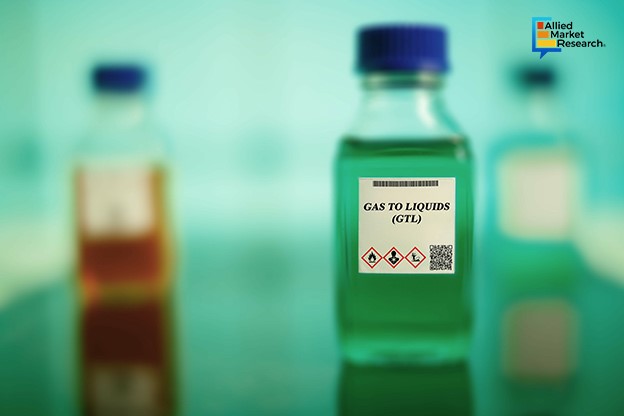Exploring the Evolution of GTL Technology from Natural Gas to Sustainable Solutions

10 Jun
2024
Highlights
- Introduction
- Potential of GTL fuels
- Role of renewable energy solutions in GTL operations
- Recent developments in the sector
Gas-to-liquid (GTL) technology converts natural gas into premium liquid products, typically derived from crude oil. These liquid products include transportation fuels like diesel and gasoline, hydrocarbons, motor oils, lubricants, and essential ingredients for everyday necessities such as detergents, cosmetics, and plastics.
In recent years, the gas-to-liquid (GTL) fuels industry has experienced substantial growth, propelled by technological advancements and a global focus on cleaner and more sustainable energy sources. The rising demand for cleaner alternatives to traditional fossil fuels is a major driver for the expansion of the GTL fuels industry. Industries and governments are increasingly exploring cleaner energy options in response to the escalating levels of carbon emissions. The gas-to-liquid (GTL) fuels industry is estimated to display a noteworthy CAGR of 4.3% by 2032.
Enhancing Sustainability in Diesel Applications with GTL Fuel
GTL fuel enhances combustion in diesel engines, contributing to reducing local air pollutants emissions. Being devoid of unwanted components like Sulphur, nitrogen, and aromatics, it is non-toxic and less environmentally harmful, especially in applications with limited or no exhaust after treatment.
Furthermore, GTL fuel offers a direct replacement for conventional diesel, requiring no modifications to engines or machinery. This allows businesses to immediately reduce local emissions without interrupting their operations. The composition of GTL Fuel, especially its low aromatic content, makes it easily biodegradable and lessens environmental and health risks compared to conventional diesel. It is non-harmful if inhaled and carries a low risk of causing eye irritation and skin damage.
Advancing GTL Operations with Renewable Energy Solutions
There's a growing trend of combining GTL processes with renewable energy sources. Integrating renewable energy into GTL operations helps reduce the carbon footprint of end products. This integration has potential in regions with abundant solar or wind resources, where renewable energy can sustainably produce synthetic fuels.
The rise of small-scale GTL plants marks a significant development in the industry, propelled by the transformation of technology. These compact and adaptable setups are well-suited for areas where natural gas is isolated or burned off, offering a lucrative means to leverage such resources. Small-scale facilities require less initial investment and can be deployed quickly, making them an appealing option for energy companies looking to profitably develop untapped gas reserves.
The Power of Strategic Alliances Driving Innovation in GTL Fuel Development
In the Gas-to-Liquids (GTL) fuels industry, strategic partnerships and collaborations are essential because of the high complexity and cost of technology development. Joint ventures involving energy firms, technology providers, and governments are prevalent, allowing for the pooling of resources and the sharing of risks associated with GTL projects. These collaborations are essential for advancing technology, enhancing efficiency, and managing regulations in the industry.
Chevron partnered with Cummins to promote the adoption of liquid renewable fuels
Chevron U.S.A. Inc. and a subsidiary of Chevron Corporation, Cummins Inc., declared a memorandum of understanding in August 2023. This agreement is planned to utilize their complementary positions within hydrogen, natural gas, and other low-carbon fuel value chains. This announcement marked an expansion of the ongoing strategic partnership between the two companies, focusing initially on hydrogen and renewable natural gas. The collaboration is anticipated to include additional liquid renewable fuels like renewable gasoline blends, biodiesel, and renewable diesel.
Shell introduced CO₂-reduced diesel in Germany
In April 2024, Shell Germany enhanced its portfolio for business clients in the transportation sector by introducing its latest offering, Renewable Diesel. This innovative fuel, derived from waste and residual materials like used cooking oil, delivers significant reductions in CO2 emissions, potentially up to 90%, throughout its entire life cycle. Produced through hydrogenation and isomerization of renewable feedstocks, Shell Renewable Diesel meets the EN15940 standard. It can be used seamlessly in both new and older diesel vehicles without requiring additional investment.
In conclusion, the gas-to-liquid (GTL) fuels industry is undergoing a transformative phase, driven by technological innovations and a growing global commitment to sustainability. With strategic alliances, advancements in renewable energy integration, and the introduction of cleaner fuel options, the future of GTL holds promise for a greener and more efficient energy landscape.
For a deeper understanding of the new prospects within the gas-to-liquid fuels industry, talk to our industry specialists today!

Koyel Ghosh
Author’s Bio- Koyel Ghosh is a blogger with a strong passion and enjoys writing in miscellaneous domains, as she believes it lets her explore a wide variety of niches. She has an innate interest in creativity and enjoys experimenting with different writing styles. A writer who never stops imagining, she has been serving the corporate industry for the last five years.
Avenue: Entire Library membership of Allied Market Research Reports at your disposal
- Avenue is an innovative subscription-based online report database.
- Avail an online access to the entire library of syndicated reports on more than 2,000 niche industries and company profiles on more than 12,000 firms across 11 domains.
- A cost-effective model tailored for entrepreneurs, investors, and students & researchers at universities.
- Request customizations, suggest new reports, and avail analyst support as per your requirements.
- Get an access to the library of reports at any time from any device and anywhere.
Related Post
-
How are Submarine Cables Transforming Global Connectivity with Enhanced User Experience?
-
Endoscopy Procedures: Transformations in Techniques and Applications
-
AI-Powered Video Analytics: How the Product Actually Works for enterprises
-
Painting Robots: Transforming Precision Coating and Creative Applications
-
Innovations in Pharmacovigilance Systems Advancing Patient Safety
-
Understanding Edge Security: Keeping Data Safe Near the Source
-
Exploring the Use and Advancements of 3D Laser Scanners in Professional Applications
-
Reinforcing Industrial Controls with Smarter Tools and Training








